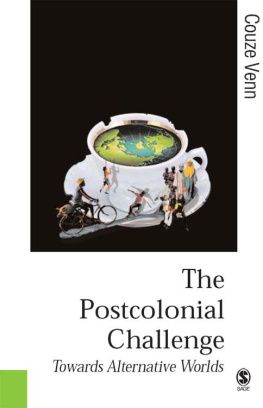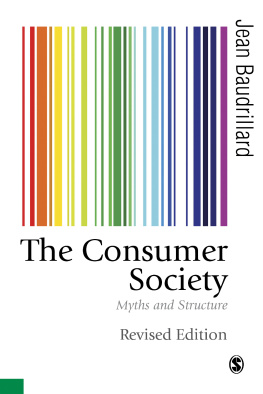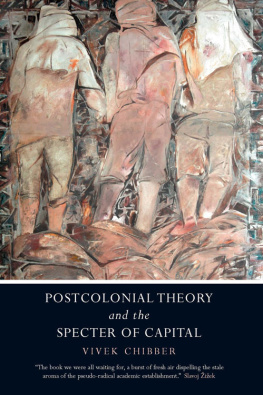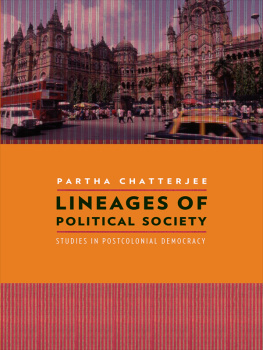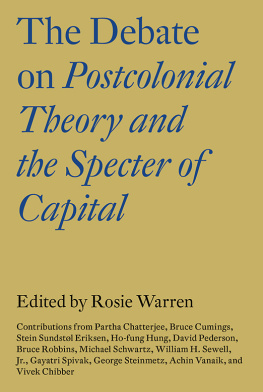Couze Venn - The Postcolonial Challenge (Published in association with Theory, Culture & Society)
Here you can read online Couze Venn - The Postcolonial Challenge (Published in association with Theory, Culture & Society) full text of the book (entire story) in english for free. Download pdf and epub, get meaning, cover and reviews about this ebook. year: 2006, publisher: SAGE Publications, genre: Romance novel. Description of the work, (preface) as well as reviews are available. Best literature library LitArk.com created for fans of good reading and offers a wide selection of genres:
Romance novel
Science fiction
Adventure
Detective
Science
History
Home and family
Prose
Art
Politics
Computer
Non-fiction
Religion
Business
Children
Humor
Choose a favorite category and find really read worthwhile books. Enjoy immersion in the world of imagination, feel the emotions of the characters or learn something new for yourself, make an fascinating discovery.
- Book:The Postcolonial Challenge (Published in association with Theory, Culture & Society)
- Author:
- Publisher:SAGE Publications
- Genre:
- Year:2006
- Rating:4 / 5
- Favourites:Add to favourites
- Your mark:
- 80
- 1
- 2
- 3
- 4
- 5
The Postcolonial Challenge (Published in association with Theory, Culture & Society): summary, description and annotation
We offer to read an annotation, description, summary or preface (depends on what the author of the book "The Postcolonial Challenge (Published in association with Theory, Culture & Society)" wrote himself). If you haven't found the necessary information about the book — write in the comments, we will try to find it.
Couze Venn: author's other books
Who wrote The Postcolonial Challenge (Published in association with Theory, Culture & Society)? Find out the surname, the name of the author of the book and a list of all author's works by series.
The Postcolonial Challenge (Published in association with Theory, Culture & Society) — read online for free the complete book (whole text) full work
Below is the text of the book, divided by pages. System saving the place of the last page read, allows you to conveniently read the book "The Postcolonial Challenge (Published in association with Theory, Culture & Society)" online for free, without having to search again every time where you left off. Put a bookmark, and you can go to the page where you finished reading at any time.
Font size:
Interval:
Bookmark:
The Postcolonial Challenge
Theory, Culture & Society
Theory, Culture & Society caters for the resurgence of interest in culture within contemporary social science and the humanities. Building on the heritage of classical social theory, the book series examines ways in which this tradition has been reshaped by a new generation of theorists. It also publishes theoretically informed analyses of everyday life, popular culture, and new intellectual movements.
EDITOR: Mike Featherstone, Nottingham Trent University
SERIES EDITORIAL BOARD
Roy Boyne, University of Durham
Mike Hepworth, University of Aberdeen
Scott Lash, Goldsmiths College, University of London
Roland Robertson, University of Aberdeen
Bryan S. Turner, University of Singapore
THE TCS CENTRE
The Theory, Culture & Society book series, the journals Theory, Culture & Society and Body & Society, and related conference, seminar and postgraduate programmes operate from the TCS Centre at Nottingham Trent University. For further details of the TCS Centres activities please contact:
Centre Administrator
The TCS Centre, Room 175
Faculty of Humanities
Nottingham Trent University
Clifton Lane, Nottingham, NG11 8NS, UK
e-mail:
web: http://www.tcs.ntu.ac.uk
Recent volumes include:
The Body in Culture, Technology and Society
Chris Shilling
Globalization and Belonging
Mike Savage, Gaynor Bagnall, Brian Longhurst
The Sport Star
Barry Smart
Diaspora and Hybridity
Kalra, Kaur and Hutnyk
Towards Alternative Worlds
Couze Venn

Couze Venn 2006
First published 2006
Published in association with Theory, Culture & Society, Nottingham Trent University
Apart from any fair dealing for the purposes of research or private study, or criticism or review, as permitted under the Copyright, Designs and Patents Act, 1988, this publication may be reproduced, stored or transmitted in any form, or by any means, only with the prior permission in writing of the publishers, or in the case of reprographic reproduction, in accordance with the terms of licenses issued by the Copyright Licensing Agency. Inquiries concerning reproduction outside those terms should be sent to the publishers.
| SAGE Publications Ltd 1 Olivers Yard 55 City Road London EC1Y 1SP SAGE Publications Inc. 2455 Teller Road Thousand Oaks, California 91320 SAGE Publications India Pvt Ltd B-42, Panchsheel Enclave Post Box 4109 New Delhi 110 017 |
British Library Cataloguing in Publication data
A catalogue record for this book is available from the British Library
ISBN 0 7619 7161 0
0 7619 7162 9
Library of Congress control number available
Typeset by C&M Digitals (P) Ltd., Chennai, India
Printed in India by Gopsons Papers Ltd, Noida
For Hari Ashurst-Venn


I have been lucky to have known so many interesting colleagues and students over the years, generous with their time and ideas, with whom I have been able to discuss and develop much of what appears in this book. These exchanges have ranged across disciplinary boundaries so that they have somehow become fused in a mixture of theory and friendships that has shaped my writing. The following people have read and commented on the whole or parts of early drafts or engaged in exchanges that have provided insights and arguments without which this book would be more inadequate than it is: Pal Ahluwalia, Roy Boyne, Neal Curtis, Mike Featherstone, Julian Henriques, Matt Merefield, Scott Lash, Tina Papoulias, Bobby Sayyid, Scarlett Thomas Patrick Williams. Particular thanks are due to Matt, Scarlett and Neal who surveyed the work as it progressed and whose keen eye for lame arguments and insipid prose has saved me from some pitfalls. A constant source of inspiration has been the research seminars held at the Nottingham Trent University that I organized for the Theory, Culture & Society Centre. Through their ideas and their work the participants have enriched my understanding of the wider issues that are addressed in the book, and I have the following to thank: Roger Bromley, Steve Brown, Elizabeth Burrell, Sokho Choe, Neal Curtis, Mike Featherstone, Anders Hog Hansen, Richard Johnson, Kenichi Kawasaki, Gulshan Khan, Joost van Loon, Kevin Love, Sonia Melo, Matt Merefield, John Phillips, Inga Scharf, Tomoko Tamari, John Tomlinson, Neil Turnbull, Sally Waddingham, Patrick Williams, Andreas Wittel. They of course bear no responsibility for any inadequacy that may remain in the book. I must thank also a number of anonymous readers whose critical comments have encouraged some much needed rewriting. My editors at Sage, Chris Rojek, Kay Bridger and Mila Steele have been amazingly patient and supportive, often making suggestions that have made my task easier. I am indebted to my family, Francesca, Scarlett, Sam, Hari, who inspire me to write and have given constant support and encouragement.

This book begins with the recognition that new forms of colonization are at work in transforming the world today, more insidious and totalizing than previous forms. It intervenes in this moment of danger at the theoretical and methodological levels, interrogating the present conjuncture through a reconceptualization of problems ranging from issues of modernization and identity to the problem of establishing a political economy of standpoint that extends the focus and terrain of postcolonial theory, drawing still on the discursive formations with which it has been in solidarity, such as feminism, race studies, cultural and development studies, but equally on positions in the social studies of science and technology and in critical phenomenology in order to interrogate the material cultures and the complex character of the apparatuses that constitute the plural lifeworlds of today. The re-orientation in approach is, of course, sustained by the vocabulary and lessons that postcolonial studies has already established in its critical engagement with European colonization and its legacy at the material and discursive levels, for example, the conviction that the relationships between the present and the past, the local and the global, the vernacular and the cosmopolitan, the postcolonial and the postmodern are much more intertwined and of longer duration than appears in many accounts in the social sciences. In challenging established boundaries, disciplinary or otherwise, and in seeking to overcome the limitations posed by the dualities of northsouth, developeddeveloping, moderntraditional, centreperiphery, it is concerned not so much with showing their interrelatedness and mutual dependencies, something already accomplished in postcolonial work, but with the underlying problem of opening critical spaces for new narratives of becoming and emancipation. The orientation of this questioning is transmodern, that is, properly postcolonial and post-occidental.
Next pageFont size:
Interval:
Bookmark:
Similar books «The Postcolonial Challenge (Published in association with Theory, Culture & Society)»
Look at similar books to The Postcolonial Challenge (Published in association with Theory, Culture & Society). We have selected literature similar in name and meaning in the hope of providing readers with more options to find new, interesting, not yet read works.
Discussion, reviews of the book The Postcolonial Challenge (Published in association with Theory, Culture & Society) and just readers' own opinions. Leave your comments, write what you think about the work, its meaning or the main characters. Specify what exactly you liked and what you didn't like, and why you think so.

